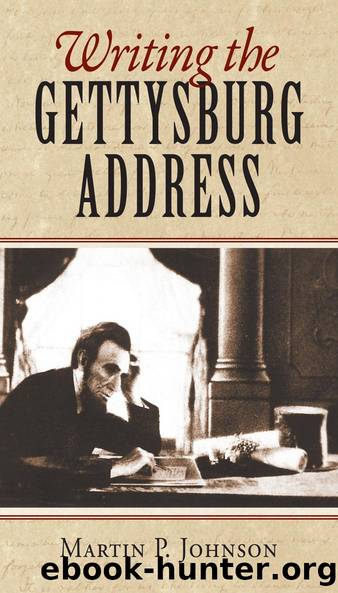Writing the Gettysburg Address by Martin P. Johnson

Author:Martin P. Johnson [Johnson, Martin P.]
Language: eng
Format: epub
Tags: Biography & Autobiography, Presidents & Heads of State, History, United States, Civil War Period (1850-1877)
ISBN: 9780700621125
Google: fipvswEACAAJ
Publisher: University Press of Kansas
Published: 2015-04-15T04:16:28+00:00
CHAPTER SEVEN
âWhat They Did Hereâ
With the Battlefield Draft in his coat pocket, Lincoln on the morning of Thursday, November 19, stepped from the Wills house into the crowded street and was greeted with such a cheer and welcome that the Philadelphia Press described him as âhalf blushing amid the intense ardor.â In his later memoir, John Russell Young, who had probably written that account thirty years before, similarly remembered, âWe gathered about the house where Lincoln resided, and waitedâled horses restlessly in attendance. The President came to the door, a fine flush and smile coming over his face at the rude welcome.â One person called out, âGive me your hand, Mr. Presidentâ; another, âGood morning, Mr. Lincolnâ; and one simply, âAbraham.â Thousands had traveled, often hundreds of miles, for this day, and the people of Gettysburg and its environs had been anticipating it for months. âMy father who was a Republican and who had voted for Lincoln in 1860, said, âWe will go to hear him,â â William Storrick remembered, and so he had a story of meeting Abraham Lincoln out in front of the Wills house that he could tell to the end of his days.1 David Wills and the cemetery agents had invited Lincoln in order to give more prominence to their grand patriotic celebration, and the attendance of hundreds, or even thousands, who had come especially to see Lincoln vindicated their gamble, even aside from the âfew appropriate remarksâ they had solicited, almost in spite of themselves.
âSuch homage I never saw or imagined could be shown to any one person as the people bestow upon Lincoln,â Josephine Roedel wrote in her diary. She had traveled from Virginia to visit family and friends and was only there by happenstance, but she still noted, âThe very mention of his name brings forth shouts of applause. No doubt he will be the next President, even his enemies acknowledge him to be an honest man.â As Roedelâs diary demonstrates, the greetings that followed Lincoln everywhere did not need to be exaggerated by the predominantly Republican press corps, for it expressed genuine support and admiration for Lincoln among the thousands who had come to the little town. The soldiers, families, officeholders, veterans, politicians, and common folk who had made the journey needed no prompting to show their devotion to the Union and its fallen heroes, and they seemed eager as well to show themselves to be friends of Lincoln. Roedelâs diary, seamlessly moving from the accolades for Lincoln to his reelection prospects, also nicely illustrates the pervasive political and even partisan atmosphere of the celebrations, which was obvious to every person on the street and is apparent in virtually all the press reports. Just as for the serenades and speeches of the night before, the unprecedented popular mobilization and high political tensions of the war pervaded every movement and action of the playersânot in spite of the grand, patriotic celebrations but because of them. Opposition papers like the New York World could
Download
This site does not store any files on its server. We only index and link to content provided by other sites. Please contact the content providers to delete copyright contents if any and email us, we'll remove relevant links or contents immediately.
| United States | Abolition |
| Campaigns & Battlefields | Confederacy |
| Naval Operations | Regimental Histories |
| Women |
In Cold Blood by Truman Capote(3374)
The Innovators: How a Group of Hackers, Geniuses, and Geeks Created the Digital Revolution by Walter Isaacson(3150)
Steve Jobs by Walter Isaacson(2889)
All the President's Men by Carl Bernstein & Bob Woodward(2364)
Lonely Planet New York City by Lonely Planet(2217)
And the Band Played On by Randy Shilts(2197)
The Room Where It Happened by John Bolton;(2150)
The Poisoner's Handbook by Deborah Blum(2135)
The Innovators by Walter Isaacson(2098)
The Murder of Marilyn Monroe by Jay Margolis(2095)
Lincoln by David Herbert Donald(1982)
A Colony in a Nation by Chris Hayes(1927)
Being George Washington by Beck Glenn(1916)
Under the Banner of Heaven: A Story of Violent Faith by Jon Krakauer(1788)
Amelia Earhart by Doris L. Rich(1689)
The Unsettlers by Mark Sundeen(1682)
Dirt by Bill Buford(1670)
Birdmen by Lawrence Goldstone(1662)
Zeitoun by Dave Eggers(1643)
